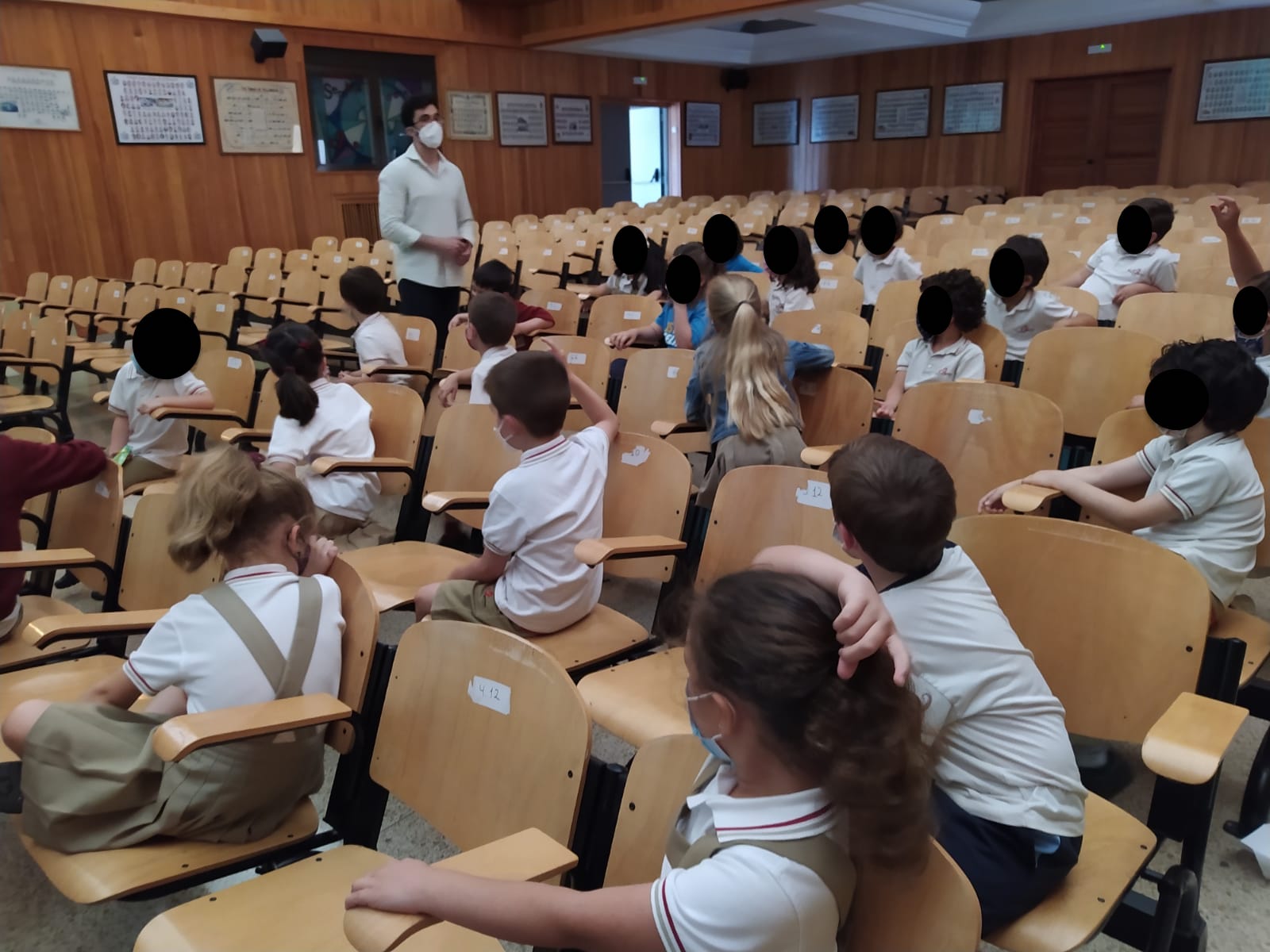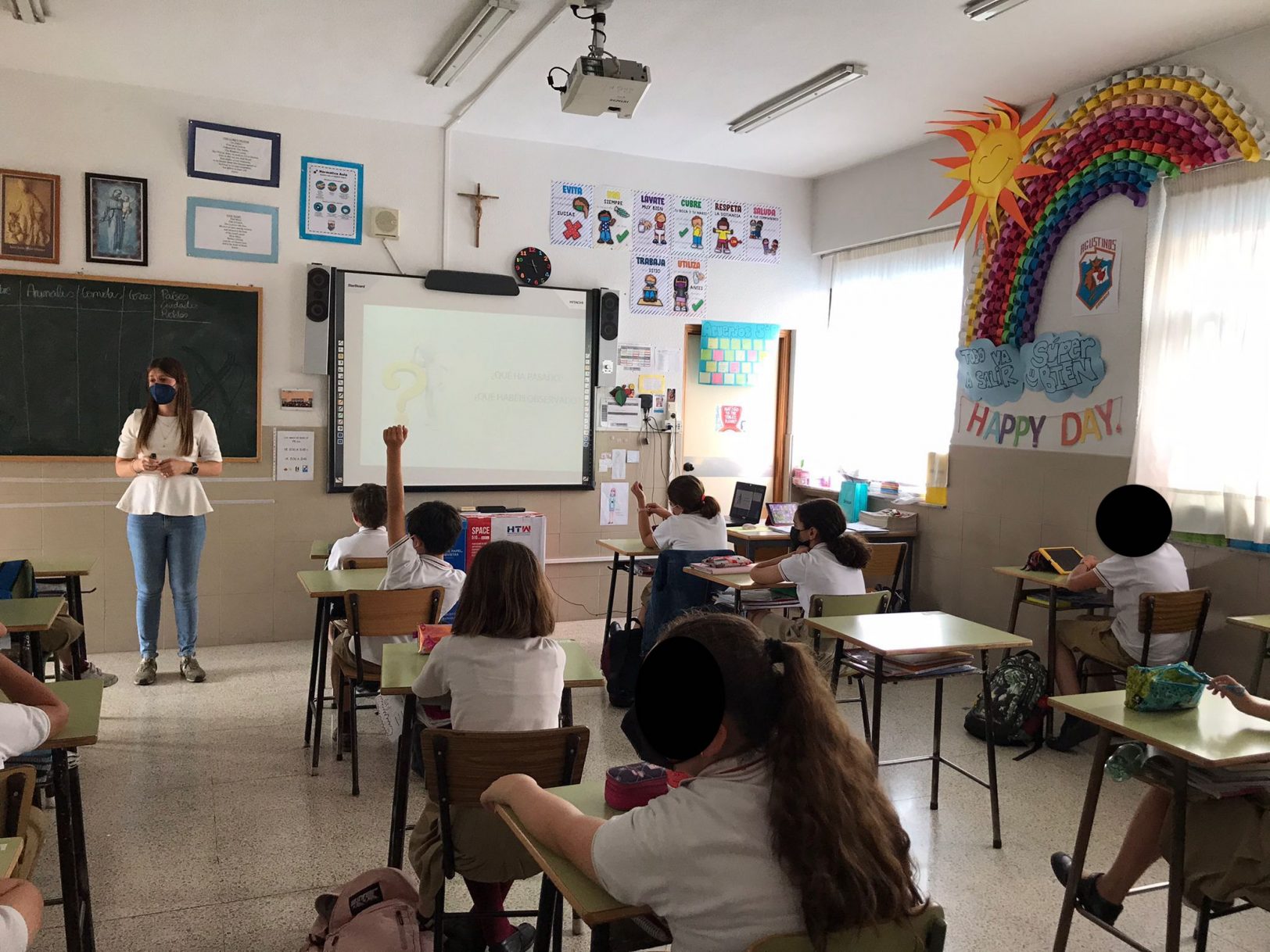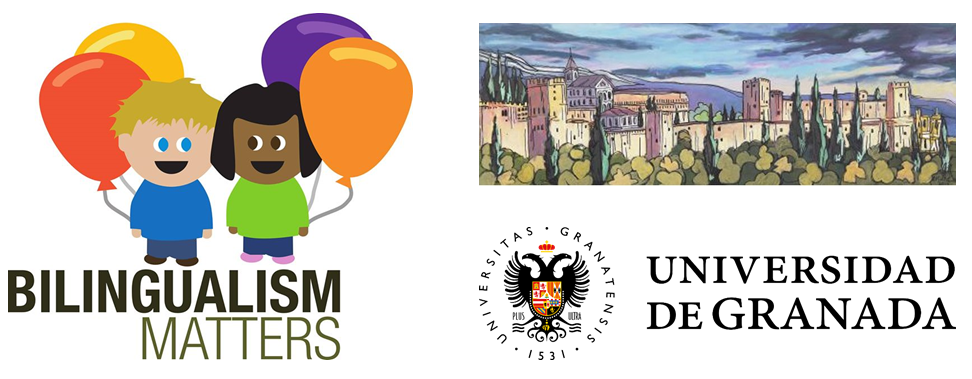Durante los meses de mayo y junio, varios miembros de Bilingualism Matters UGR han visitado en dos ocasiones el Colegio Santo Tomás de Villanueva (Agustinos), situado en el centro de Granada. El motivo de estas visitas fue ofrecer charlas divulgativas sobre ciencia, lenguaje y bilingüismo.
During the months of May and June, members of the Bilingualism Matters UGR team visited the Santo Tomás de Villanueva (Agustinos) Elementary/Middle School, located in Granada city centre. The purpose of these two visits was to impart several talks about science, language and bilingualism.
El 26 de mayo nuestro equipo BM Ugr (Marta Rivera, Melodie Bellegarda, Antonio Iniesta, y Elena García-Guerrero) pudo acceder a las aulas de primero y segundo curso de educación secundaria del Colegio Santo Tomás de Villanueva. Durante nuestras charlas hablamos con los alumnos y las alumnas sobre el método científico, la importancia de de la mujer y la niña en la ciencia y sobre bilingüismo en el aula. Creamos un debate sobre lo que consideramos o no ser bilingüe y les mostramos las evidencias que los ayuda a identificarse como personas bilingües. Terminamos las actividades con un debate sobre ciertas afirmaciones que se han observado en medios de comunicación y que, sin embargo, son mitos asociados al bilingüismo inmersos en nuestra sociedad como que “una persona bilingüe conoce a la perfección sus dos idiomas”. Los alumnos y alumnas respondieron al debate e interactuaron con sus propias opiniones y ejemplos.
On May 26th we (Marta Rivera, Melodie Bellegarda, Antonio Iniesta, and Elena García-Guerrero) had our first visit to the 6th grade and 7th grade classrooms in Santo Tomás de Villanueva Middle School. During our talks, we explained the concept of the scientific method to the students and we emphasized the importance of women and girls in science. Finally, we showed the relationship between these concepts and bilingualism. We discussed what it means to be bilingual or not and we showed them scientific evidence that helped them to identify themselves as bilingual speakers. We finished with a debate about the myths/truths of bilingualism that are often seen in the media, such as “a bilingual person knows both languages perfectly”. The students participated in the debate and interacted by giving their opinions and telling personal anecdotes.
Por último, les pedimos que participaran en un concurso en twitter donde los 5 tweets más originales serían compartidos en nuestras redes sociales y recibirían un premio. (El resultado del concurso se puede ver en nuestro twitter @BMatUGR.) Los alumnos y alumnas usaron su imaginación y supieron comunicar la esencia de nuestra charla. Fue un placer hablar con ellos y ellas y ayudar a cambiar su imagen sobre el bilingüismo.
Finally, we ask them to participate in a Twitter contest where the most original tweets would be shared on our social media and they would receive a prize. (The contest results can be consulted on our twitter @BMatUGR.) The students used their imagination to communicate the essence of our talk. It was a pleasure talking with them and helping them to change their concept of bilingualism.
Del mismo modo, el 17 de junio impartimos (Teresa Quesada, Fernando Martín-Villena y Elena García-Guerrero) charlas a alumnos de primero, cuarto y quinto de educación primaria. Las actividades fueron diferentes para cada curso, pero todas pretendían acercar al alumnado el fenómeno del bilingüismo y mostrarles cómo podemos investigarlo. Los alumnos de primero de primaria escucharon un cuento narrado en tres idiomas y a raíz de esto, se fomentó un debate muy interesante donde los pequeños participaron contando qué idiomas conocen, cuáles hablan, e incluso plantearon dudas. También recibieron varios consejos sobre cómo convertirse en científicos, y pensamos que algunos de ellos lo serán en el futuro.
On June 17th, we (Teresa Quesada, Fernando Martín-Villena, and Elena García-Guerrero)returned to the school for more talks and workshops with the 1st graders, 4th graders and 5th graders. The activities were different for each class, but all of them aimed at introducing the phenomenon of bilingualism to these children and showing them how it can be investigated. The 1st graders listened to a story narrated in three languages and afterwards, they had a stimulating discussion where they talked about the languages they know, which ones they speak, and even asked some questions. They also received some advice on how to become good scientists, and we have no doubt some of them will eventually become great scientists.
Los alumnos de 4º y 5º reflexionaron sobre lo que implica ser bilingüe y cómo procesamos mentalmente el lenguaje. Para ello, llevaron a cabo algunos experimentos psicolingüísticos. Al final de cada actividad, les regalamos un bolígrafo, algunas pegatinas, ¡y hasta un carnet de investigador! Los alumnos quedaron encantados y, desde el equipo de Bilingualism Matters UGR, esperamos haberles creado cierta curiosidad por los idiomas y la investigación científica.
The 4th and 5th graders reflected on what it means to be bilingual and on how we mentally process language. To do so, they participated in some psycholinguistic experiments. Once the workshop was finished, the students received a pen, some stickers, and a “researcher ID card”! The students were delighted with these activities and gifts and, from the Bilingualism Matters UGR team, we hope to have created some curiosity for languages and scientific research.
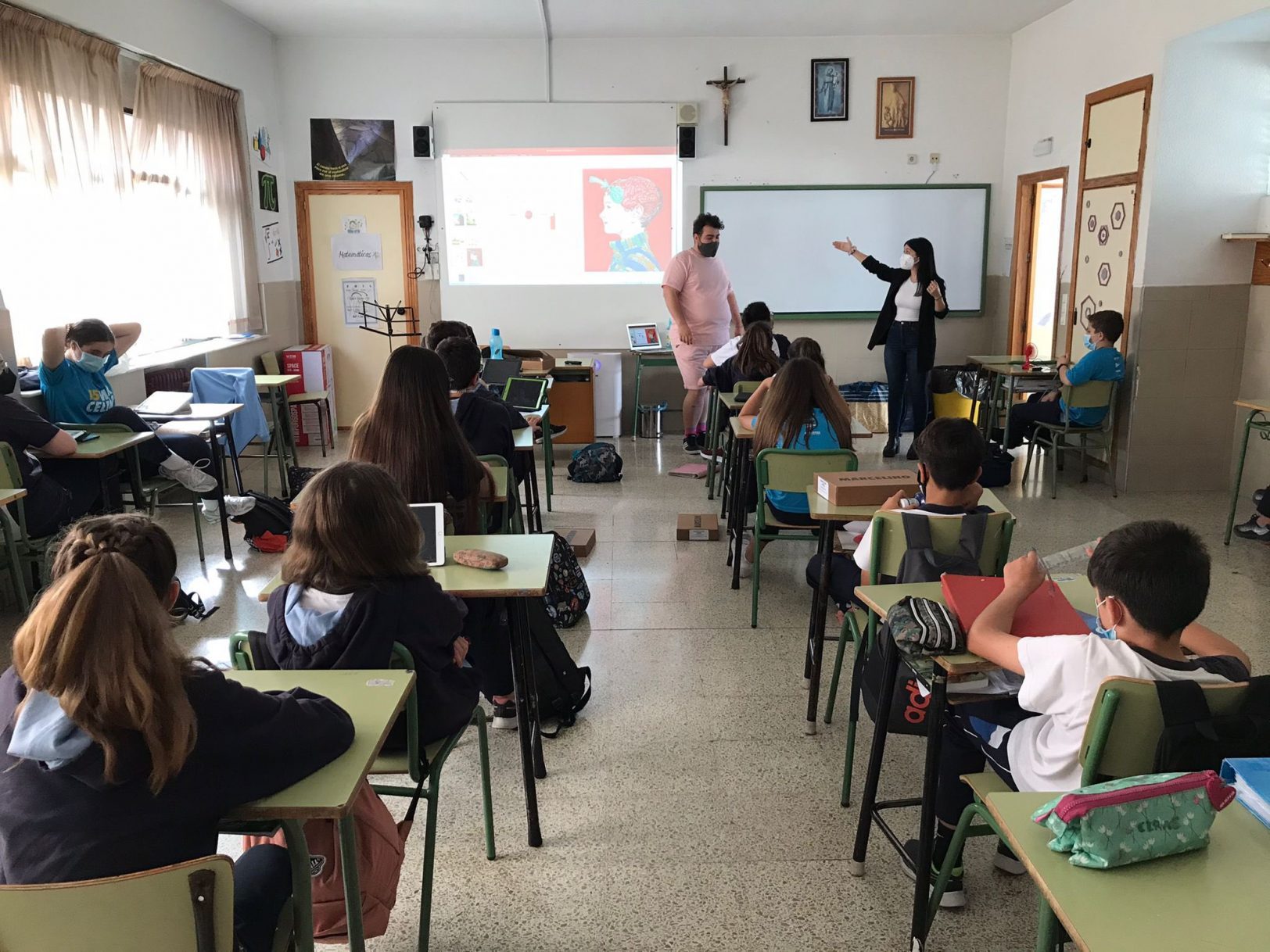
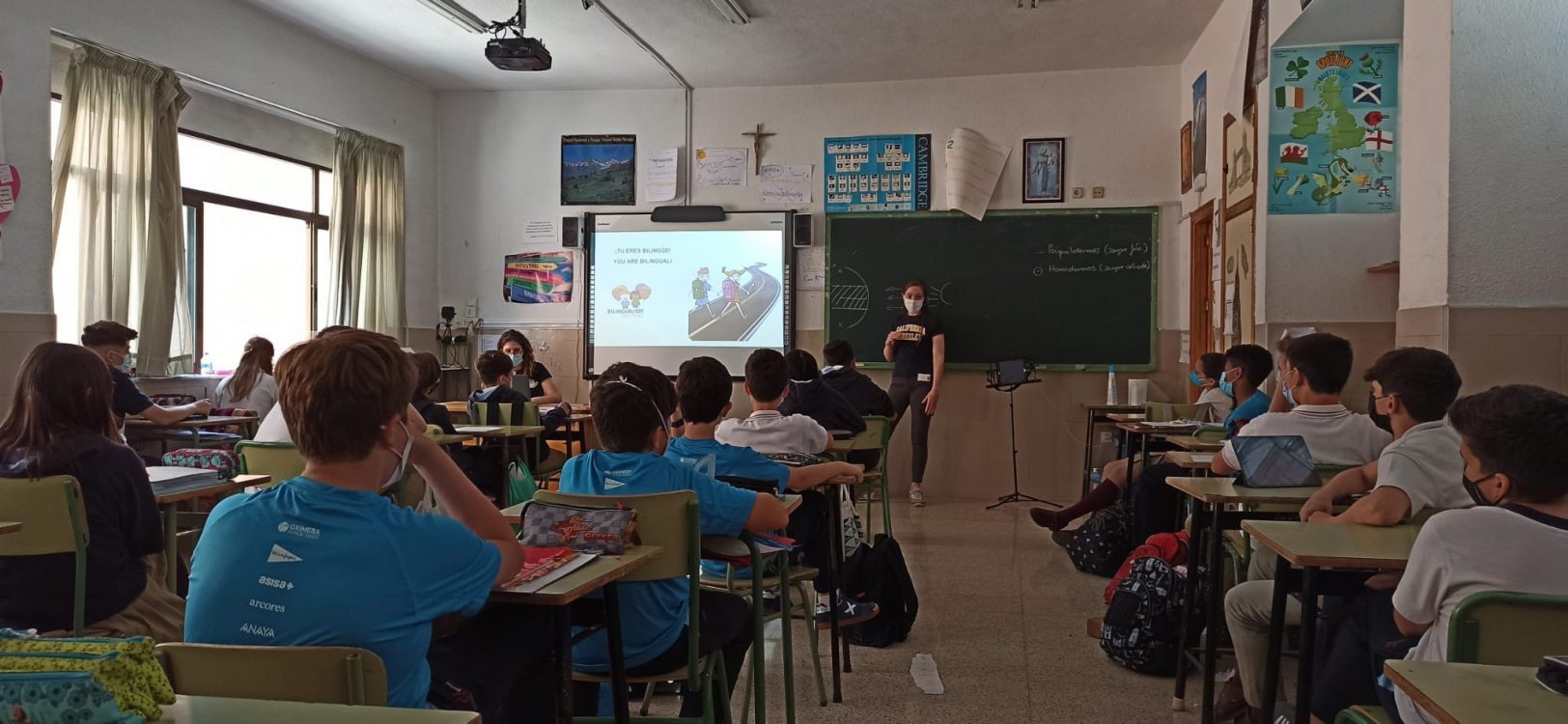
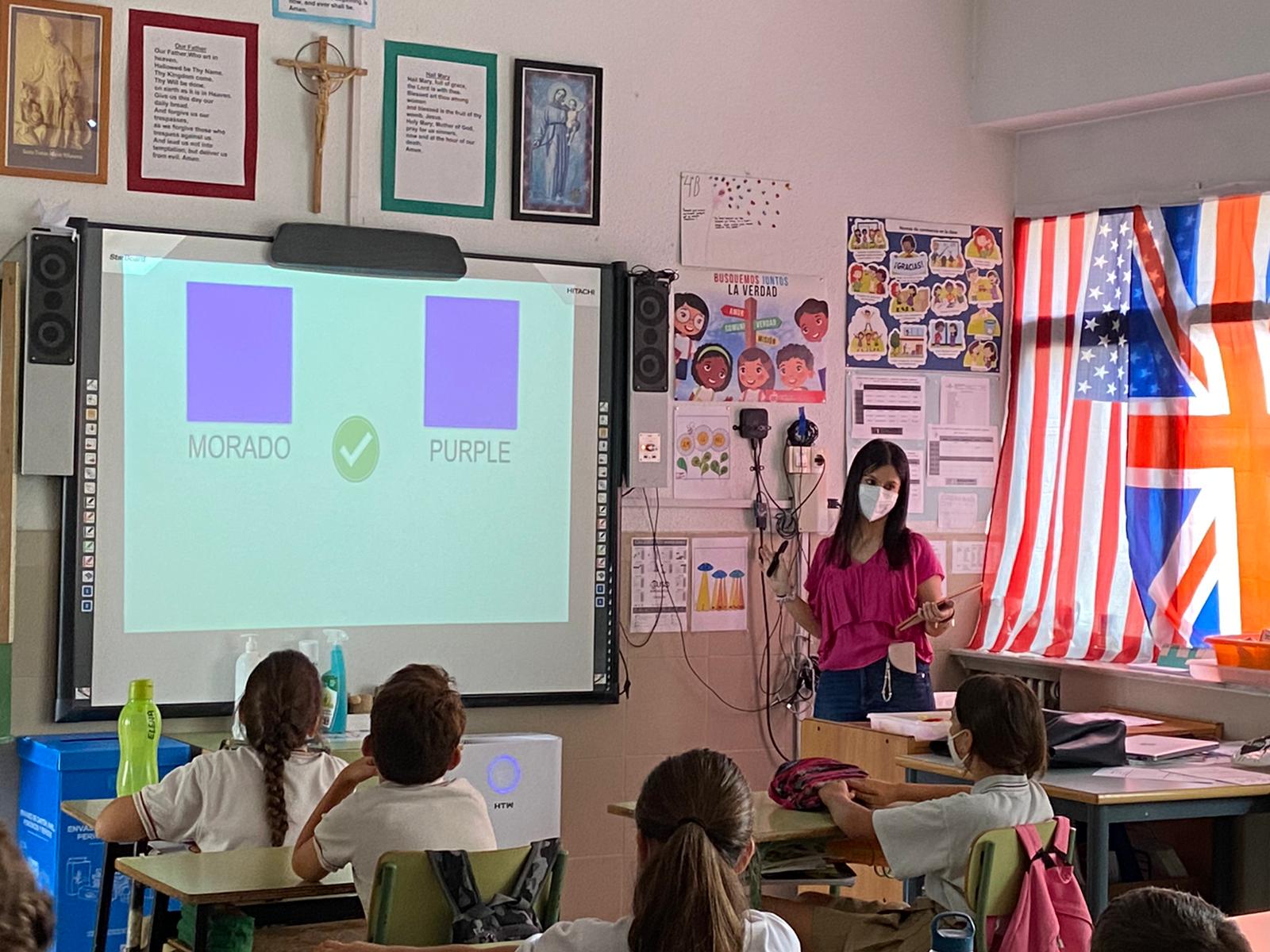
Elena García-Guerrero haciendo un ejercicio de palabras cognadas con los niños de primaria. // Elena García-Guerrero doing an exercise with the elementary school children about cognates.
